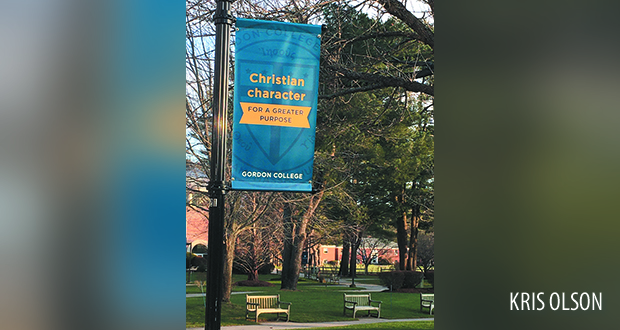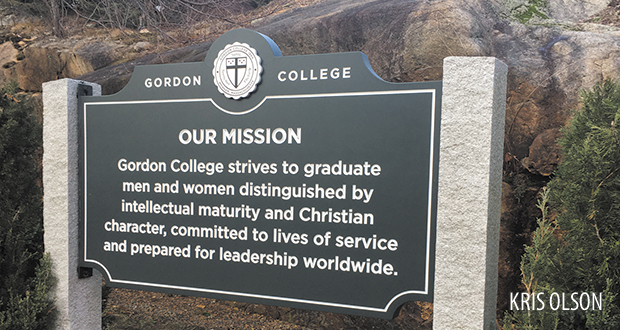
Defendant Gordon College in Wenham, Massachusetts
A case recently argued before the Massachusetts Supreme Judicial Court pits the religious freedom of a Christian college against a professor’s right to seek redress for alleged workplace discrimination.
Specifically, the SJC in DeWeese-Boyd v. Gordon College, et al. was asked whether the First Amendment’s “ministerial exception” — which the U.S. Supreme Court first recognized in its 2012 decision in Hosanna-Tabor Evangelical Lutheran Church & School v. E.E.O.C. — bars the claims of a professor at an evangelical Christian college who says that she was discriminated against after vocally and publicly opposing her employer’s policies relating to LGBTQ+ individuals.
One of the plaintiff’s lawyers, Hillary Schwab of Fair Work in Boston, called DeWeese-Boyd an important case that could impact thousands of workers in Massachusetts, including anyone who works at a religiously affiliated school or hospital.
In Schwab’s estimation, Gordon College is asking the SJC essentially to rule that any Christian who works at a Christian institution is a “minister,” which would mean that those employees “could be fired, demoted [and] denied promotions for flagrantly discriminatory reasons, without consequence.”
“The ministerial exception should not be construed so broadly that this doctrine becomes a green light for employers with relatively loose religious affiliation to discriminate on any basis against their entire staff.”
— Julia Schlozman, Jewish Alliance for Law and Social Action
An adverse ruling could extend even to employees of institutions whose religious affiliation is fairly nominal, and even if those employees spend most of their time doing primarily secular work, noted Julia Schlozman of the Jewish Alliance for Law and Social Action in Boston, which filed an amicus brief in support of the plaintiff.
“The ministerial exception should not be construed so broadly that this doctrine becomes a green light for employers with relatively loose religious affiliation to discriminate on any basis against their entire staff,” Schlozman argued.
In the decision below, Superior Court Judge Jeffrey T. Karp agreed, ruling that former Gordon College Professor Margaret DeWeese-Boyd’s suit should not be dismissed. But since Karp’s decision, the legal landscape may have shifted.
Game changer?
On July 8, 2020, the U.S. Supreme Court issued its decision in Our Lady of Guadalupe School v. Morrissey-Berru, ruling that the ministerial exception applied to two teachers at Roman Catholic elementary schools in Los Angeles.
In Our Lady of Guadalupe, each of the teachers taught religion in the classroom, worshipped and prayed with students, and was evaluated in part based on how well they helped their schools develop a faith community and modeled that faith personally.
Back in 2012, the SJC reached a similar decision in Temple Emanuel of Newton v. Massachusetts Comm’n Against Discrimination, holding that the ministerial exception prohibited discrimination claims asserted by a teacher that “taught religious subjects at a school that functioned solely as a religious school, whose mission was to teach Jewish children about Jewish learning, language, history, traditions, and prayer.”
Despite that guidance, Karp decided DeWeese-Boyd belonged in a different category. To reach that conclusion, he looked to the “functional approach” established by the Kentucky Supreme Court in the 2014 case Kirby v. Lexington Theol. Seminary.
Karp found that while DeWeese-Boyd had a seminary degree when she was hired as a professor of social work, she did not have a religious title at Gordon, did not represent herself as a minister, and did not play any role in religious services, convey Christian doctrine to the community, or lead her students in prayer.
The parties and several amici disagree sharply over whether that functional approach is compatible with Our Lady of Guadalupe.
Schwab said that, far from deviating from the decision, Karp “essentially predicted” Our Lady of Guadalupe, specifically Justice Samuel A. Alito Jr.’s key sentence in the majority opinion: “What matters, at bottom, is what an employee does.”
But others take a different view.
To Dwight G. Duncan of North Dartmouth, the Supreme Court’s decision “gives a generous interpretation to the ministerial exemption, dispensing with formalities like title and ordination, and assumes that teachers at religious schools carry out a religious mission.”
He believes Karp would have been compelled to rule differently, if he had the benefit of Our Lady of Guadalupe.
Duncan, a constitutional law professor at University of Massachusetts School of Law, is local counsel to the Council of Christian Colleges and Universities, which filed a joint amicus brief in DeWeese-Boyd with 46 Christian colleges and universities.
What is at stake for those colleges and universities is their ability to be faithful to their mission, Duncan said. An adverse decision would limit educational opportunities for people of faith and others who seek intellectual and cultural diversity in higher education, he added.

Defendant Gordon College’s mission statement
Gordon College’s attorneys, Andrew C. Pickett and Jeffrey S. McAllister, of Jackson Lewis in Boston, had not responded to a request for comment.
Institution’s status not conceded
To determine whether the ministerial exception applies, a court must find 1) that the employer is a religious institution, and 2) that the employee serves that institution as a minister.
Karp found Gordon College qualifies as a religious institution for purposes of the first prong of the ministerial exception, pointing to its bylaws and articles of organization, which state that it was formed to provide instruction in the Bible, and to prepare students for missionary work, Christian ministry and “other special forms of Christian work.”
Prospective Gordon students must affirm their belief in the Christian faith and take religious-based courses and attend on-campus religious services once enrolled.
But perhaps even more so, Gordon holds itself out as a liberal arts institution, and as such is a “far cry from the institutions in Guadalupe and Temple Emanuel, which had religion as their “very reason for … existence,” DeWeese-Boyd argues in her brief.
Moreover, there is case law that suggests that a particular institution can be considered a religious one with respect to only a small segment of its workforce.
For example, in the 8th Circuit case Scharon v. St. Luke’s Episcopal Presbyterian Hospitals and the 2nd Circuit case Penn v. New York Methodist Hospital, the hospitals were found to be religious institutions, but only with respect to the employment of their respective chaplains. The Penn court called it “a close question.”
“It is unlikely that the court [in Penn] would have reached the same decision were it considering the employment of a worker in the hospital’s medical, cleaning services, or food services departments,” DeWeese-Boyd’s brief notes.
While the purpose of the Department of Pastoral Care that employed the plaintiff in Penn “was to provide religious care to the hospital’s patients,” the purpose of the social work program at Gordon College is something else entirely, argues a brief signed by the Charles Hamilton Houston Institute of Race and Justice, GLBTQ Legal Advocates & Defenders, Lawyers for Civil Rights, and the Massachusetts Employment Lawyers Association, among others.
“It is clear that Gordon College’s Social Work Program was designed to prepare students for a secular profession, not to transmit, inculcate, or train students in the practice of any particular faith,” the brief reads.
The groups contend that the SJC may affirm Karp’s decision “on this ground alone.”
Gordon College believes that such a suggestion is nonsense, noting that the summary judgment record is replete with evidence that it is an institution whose mission is “marked by clear or obvious religious characteristics,” a standard established by the 5th U.S. Circuit Court of Appeals in the case Conlon v. InterVarsity Christian Fellowship.
But even most religiously affiliated institutions “adhere to basic norms, values and principles of higher education, and at the center of that is academic freedom,” noted Risa Lieberwitz, general counsel of the American Association of University Professors.
That would seem to include Gordon College, given that “academic freedom” is listed among the “Foundations for Gordon’s Philosophy of Education” in the college’s faculty handbook, AAUP’s amicus brief notes.
AAUP urged the SJC to be mindful of what it sees as a significant distinction between Gordon College and the religious elementary schools in Our Lady of Guadalupe.
Integration vs. inculcation
While Gordon College convinced Karp that it was a religious institution, it failed to sell Karp on its characterization of DeWeese-Boyd as a “minister.”
Still, Gordon believes she qualifies because DeWeese-Boyd was required to “integrate” the school’s faith into her teaching, and at least some of her performance evaluations touched on the topic.
“When a school with a religious mission entrusts a teacher with the responsibility of educating and forming students in the faith, judicial intervention into disputes between the school and the teacher threatens the school’s independence in a way that the First Amendment does not allow,” Alito had written for the majority in Our Lady of Guadalupe.
But DeWeese-Boyd argues that Gordon College is conflating what it means to “integrate” versus “inculcate” faith.
What DeWeese-Boyd has been asked to do — “integration” — merely entails “the development of a Christian perspective within the faculty member’s academic discipline.”
“What integration is not is any sort of requirement that professors teach religion or the Bible, incorporate Scripture into their lessons, pray with their students, or perform any religious functions,” her attorneys write.
Nor should it matter, they argue, that Gordon College added a sentence to its handbook in October 2016 stating: “In the Gordon College context, faculty members are both educators and ministers to our students.”
The school’s general counsel later admitted that the language, which spawned “serious faculty opposition,” was designed to allow the school to “trigger judicial deference to protect our First Amendment rights,” according to DeWeese-Boyd’s brief.
Given Justice Alito’s admonition that “what an employee does” is what matters, DeWeese-Boyd notes that she had none of the litany of religious duties of the plaintiffs in Our Lady of Guadalupe.
Moreover, in other cases involving institutions like Gordon, courts have found that Christians with secular duties at religious institutions are not ministerial employees, she says.
These include an exercise science professor in the 2017 Oregon federal District Court decision Richardson v. Northwest Christian University; a psychology professor in the 1980 5th Circuit case EEOC v. Mississippi College; and nuns who worked as computer science professors at a Catholic university in the 1992 New Jersey federal District Court decision Welter v. Seton Hall University.
The court in Richardson found that, with the plaintiff’s job, ‘“any religious function was wholly secondary to her secular role: she was not tasked with performing any religious instruction and she was charged with no religious duties such as taking students to chapel or leading them in prayer.”
DeWeese-Boyd says that is her situation, too.
Moreover, her titles — “associate professor of social work” and “faculty member” — are secular and contain no religious substance, she adds.
But Gordon College argues that it “made clear at all times that it expected and required Plaintiff to integrate Gordon’s religious message into her teaching and scholarship, and that it relied on Plaintiff’s religious background and her stated intentions to integrate those fundamentals as a faculty member when hiring her.”
Moreover, it points to several documents DeWeese-Boyd herself authored over the course of her employment in which she “demonstrates her duty to integrate the Christian faith into her curriculum and scholarship.”
 New England Biz Law Update
New England Biz Law Update
